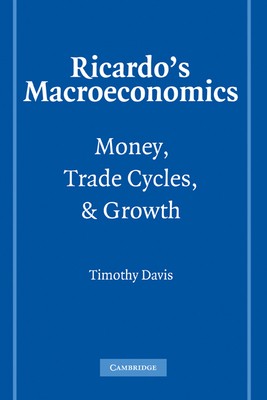
- We will send in 10–14 business days.
- Author: Timothy Davis
- Publisher: Cambridge University Press
- ISBN-10: 0521169275
- ISBN-13: 9780521169271
- Format: 15.2 x 22.9 x 1.9 cm, softcover
- Language: English
- SAVE -10% with code: EXTRA
Reviews
Description
The outline of modern macroeconomics took shape in Britain in the early nineteenth century thanks, in part, to David Ricardo, one of the most influential economists of the time. Britain was challenged by monetary inflation, industrial unemployment and the loss of jobs abroad. Ricardo pointed the way forward. As a financier and Member of Parliament, he was well versed in politics and commercial affairs. His expertise is shown by the practicality of his proposals, including the resumption of the gold standard, which was essential given the destabilizing policy of the Bank of England. Ricardo's expertise appears also in his debate with T. R. Malthus about whether an industrial economy can suffer a prolonged depression. Say's Law of Markets and the Quantity Theory of Money figure prominently in his works, but not in an extreme form. He was instead a subtle theorist, recognizing the non-neutrality of money, trade depressions and unemployment.
EXTRA 10 % discount with code: EXTRA
The promotion ends in 17d.05:17:53
The discount code is valid when purchasing from 10 €. Discounts do not stack.
- Author: Timothy Davis
- Publisher: Cambridge University Press
- ISBN-10: 0521169275
- ISBN-13: 9780521169271
- Format: 15.2 x 22.9 x 1.9 cm, softcover
- Language: English English
The outline of modern macroeconomics took shape in Britain in the early nineteenth century thanks, in part, to David Ricardo, one of the most influential economists of the time. Britain was challenged by monetary inflation, industrial unemployment and the loss of jobs abroad. Ricardo pointed the way forward. As a financier and Member of Parliament, he was well versed in politics and commercial affairs. His expertise is shown by the practicality of his proposals, including the resumption of the gold standard, which was essential given the destabilizing policy of the Bank of England. Ricardo's expertise appears also in his debate with T. R. Malthus about whether an industrial economy can suffer a prolonged depression. Say's Law of Markets and the Quantity Theory of Money figure prominently in his works, but not in an extreme form. He was instead a subtle theorist, recognizing the non-neutrality of money, trade depressions and unemployment.


Reviews